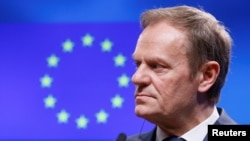A push by Poland's Eurosceptic government to remove fellow-countryman Donald Tusk from one of the top jobs in the European Union failed to win any public support on Monday as EU foreign ministers met to discuss it in
Brussels.
But Poland, which is also at loggerheads with Brussels over climate change, migration and its treatment of judges and the media, was signaling it would not budge — possibly setting the stage for a showdown at a summit of EU leaders on Thursday.
Tusk's first term expires this May and he enjoys the comfortable backing of most EU states to be reappointed for another 2-1/2 years as president of the European Council, responsible for chairing summits of EU leaders.
But Poland, where the head of the ruling party is Tusk's arch-foe, wants to oust Tusk from the influential post and replace him with another Pole, Jacek Saryusz-Wolski.
Many in Brussels dread opening another feud at a time when the bloc faces daunting challenges including handling the pending departure of Britain, facing up to an assertive Russia and getting to grips with new U.S. President Donald Trump.
But Poland's ruling party boss Jaroslaw Kaczynski is implacably opposed to Tusk, holding him "morally responsible" for the death of his twin brother, President Lech Kaczynski, in a plane crash in Russia in 2010, when Tusk was Polish prime minister. Polish and Russian probes blamed pilot error.
Polish Foreign Minister Witold Waszczykowski, in Brussels for talks with his EU peers, said Warsaw was insistent on Saryusz-Wolski, a center-right European Parliament member.
"This is our candidate and he is in the game. This is the only Polish candidate right now for the post of the European Council head. There is no other Polish candidate," he said.
Over a Sunday dinner in Brussels, Waszczykowski had sought to persuade his peers from Hungary, the Czech Republic and Slovakia, as well as Belgium, Luxembourg and the Netherlands.
The leaders of four ex-communist eastern EU states met in Warsaw last week, but failed to agree on opposing Tusk together.
The Czech minister, Lubomir Zaoralek, said on Monday that the easterners had much to lose.
"If there were other candidates, it could have a very unpleasant result. ... I am afraid that this can result in central and eastern Europe losing its representative, and I would consider that a serious mistake," he said.
The fact that the bitter political rivalry between Kaczynski and Tusk has spilled over to Brussels has raised many eyebrows in the European capital. Waszczykowski refused to say if any other country backed Saryusz-Wolski, and the other ministers did not offer any public support.
Pandora's Box
A soft-spoken centrist, Tusk is widely seen in the EU as a safe pair of hands. The decision on whether to give him a new term is expected this Thursday. While unanimity would have been the preferred option, a majority vote is enough to keep him.
Waszczykowski suggested the decision could be delayed, but Zaoralek said that would risk opening a Pandora's box. No third candidate has emerged so far.
"There is a majority for Tusk, and pleasing Kaczynski is not on everyone's mind in Brussels," said a senior diplomat from one of the other states that took part in the Sunday dinner.
Another senior diplomat said agreeing to a third candidate to appease Poland, or delaying the decision beyond Thursday would be succumbing to blackmail.
"Whatever the cost at this stage, we need to get it over with as soon as possible," the person said.
But some diplomats and officials suggested Poland could decide to pick a fight on Thursday, possibly by broadening the talks to include EU climate policies. EU member states reached an early agreement on reforming the bloc's carbon market last week despite opposition from Poland, which wants to protect its economically important coal industry.
Additional reporting by Philip Blenkinsop and Alissa de Carbonnel in Brussels, Robert Muller in Prague.





